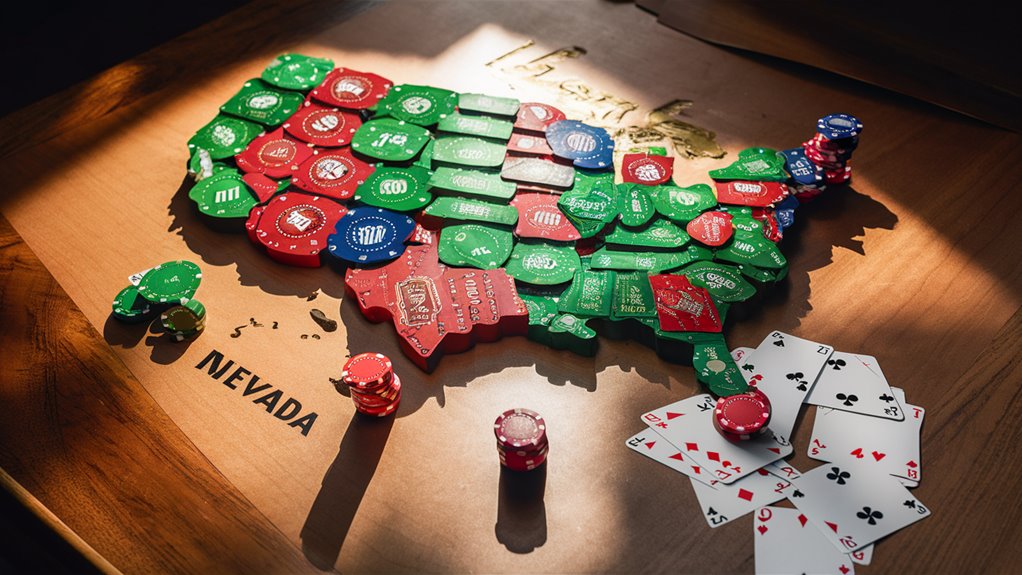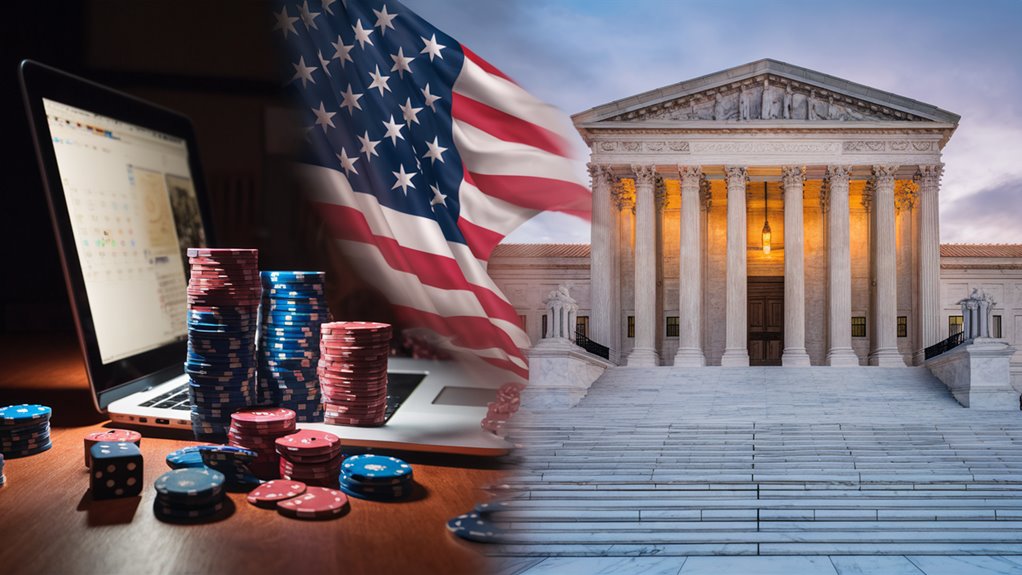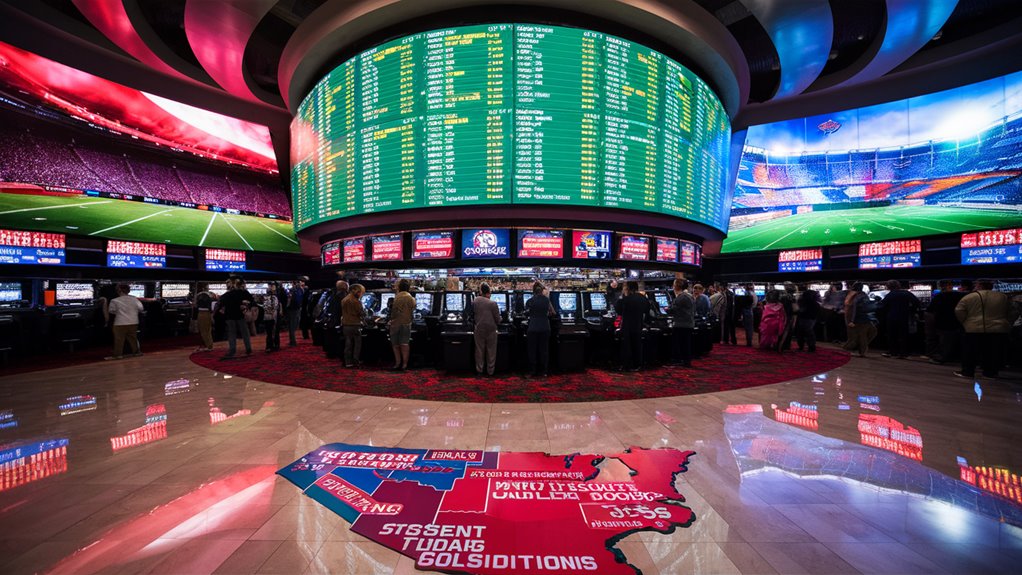
The Legal Landscape of Gambling in the US
Understanding the US Gambling Legal Framework
Federal and State Gambling Regulations
The U.S. gambling landscape operates under a dual regulatory system. Federal legislation like the Wire Act and UIGEA (Unlawful Internet Gambling Enforcement Act) establish fundamental restrictions, while individual states maintain primary control over gambling activities within their jurisdictions.
Current State-Level Gaming Authorization
- 45 states operate regulated state lotteries
- Over 30 states permit legal sports betting https://maxpixels.net/
- 6 states allow online casino gaming
- Tribal gaming operations function under IGRA (Indian Gaming Regulatory Act)
Regulatory Requirements and Compliance
States implement comprehensive regulatory frameworks including:
- Licensing protocols
- Consumer protection measures
- Compliance monitoring systems
- Geofencing technology requirements
- Identity verification procedures
- Anti-money laundering (AML) controls
Tribal Gaming Operations
Native American gaming operates through:
- Sovereign rights recognition
- State-tribal compacts
- Federal oversight under IGRA
- Independent regulatory commissions
Emerging Technology and Future Regulation
The regulatory landscape continuously adapts to:
- New gaming technologies
- Digital payment systems
- Responsible gaming tools
- Cybersecurity requirements
- Interstate gaming considerations
Federal Gambling Laws

A Comprehensive Guide to Federal Gambling Laws
Key Federal Gambling Legislation
The Interstate Wire Act of 1961 and the Unlawful Internet Gambling Enforcement Act (UIGEA) form the foundation of federal gambling regulation in the United States.
The Wire Act specifically targets interstate sports betting transmissions, while UIGEA focuses on regulating online gambling payment processing.
Historic Changes in Sports Betting Regulation
A landmark shift occurred in 2018 when the Supreme Court struck down the Professional and Amateur Sports Protection Act (PASPA) through the Murphy v. NCAA decision.
This pivotal ruling empowered individual states to establish their own sports betting frameworks, fundamentally transforming the American gambling landscape.
Tribal Gaming and Federal Oversight
The Indian Gaming Regulatory Act of 1988 established crucial guidelines for tribal casino operations nationwide. This legislation creates a structured framework for Native American tribes to conduct gaming activities while maintaining regulatory compliance.
Federal Financial Regulations
The Bank Secrecy Act implements strict anti-money laundering (AML) protocols for gambling establishments. Casinos must maintain comprehensive records and report:
- Large cash transactions
- Suspicious activity reports (SARs)
- Currency transaction reports (CTRs)
Interstate and Online Gambling Framework
While federal law primarily addresses interstate gambling activities and online betting transactions, individual states retain significant authority over gambling within their borders.
This creates a complex regulatory environment where federal and state jurisdictions intersect and complement each other.
State-by-State Gaming Regulations

State-by-State Gaming Regulations Guide
Overview of U.S. Gaming Regulations
State sovereignty plays a crucial role in regulating gambling activities, creating a complex regulatory framework across America.
The primary regulated categories include casino gambling, lottery operations, sports betting, horse racing, and tribal gaming.
Casino Gaming Landscape
Nevada stands as the nation’s most permissive jurisdiction for casino operations, while Utah and Hawaii maintain complete gambling prohibitions.
Tribal gaming operations function in 29 states under the Indian Gaming Regulatory Act, with regulations governed by state-tribal agreements.
Sports Betting Evolution
The 2018 Supreme Court PASPA decision transformed the sports betting landscape nationwide.
Currently, over 30 states authorize sports wagering operations, with varying regulatory frameworks and implementation models.
State Lottery Systems
Forty-five states operate government-run lottery systems, offering diverse gaming portfolios. Each jurisdiction maintains unique:
- Game selections
- Prize structures
- Revenue allocation models
- Operating procedures
Regulatory Framework
State gaming commissions serve as primary oversight bodies, establishing:
- Licensing requirements
- Tax structures
- Compliance protocols
- Game authorizations
- Responsible gambling measures
Interstate Gaming Compliance
Gaming operators must navigate distinct regulatory requirements across state lines, adhering to:
- Local licensing standards
- State-specific taxation
- Operating restrictions
- Compliance reporting
- Consumer protection measures
Online Betting Legislation

Online Betting Legislation in the United States
Current Legal Framework
The online betting landscape in the United States underwent a significant transformation following the Department of Justice’s 2011 Wire Act reinterpretation.
This pivotal decision enabled states to independently regulate online gambling within their jurisdictions, while maintaining restrictions on interstate betting operations.
State-by-State Legalization Status
Online Casino Gaming
Six states have fully embraced regulated online casino gambling:
- New Jersey
- Pennsylvania
- Michigan
- West Virginia
- Delaware
- Connecticut
Sports Betting Expansion
Online sports wagering has experienced broader adoption, with over 30 states implementing legal frameworks for sports betting operations.
Each jurisdiction maintains unique regulatory requirements and compliance protocols.
Operational Requirements
Licensing and Compliance
Gaming operators must secure individual licenses for each state where they conduct business.
Implementation of geofencing technology remains mandatory to restrict betting activities within state boundaries.
Key operational mandates include:
- Identity verification systems
- Responsible gambling tools
- Regular platform audits
- Strict payment processing protocols
Federal Oversight
The Unlawful Internet Gambling Enforcement Act (UIGEA) continues to govern interstate gambling transactions and payment processing.
This federal framework operates alongside state-specific regulations, creating a comprehensive system of betting compliance measures.
Regulatory Infrastructure
State gaming authorities maintain distinct frameworks for:
- Licensing requirements
- Player protection measures
- Financial transaction monitoring
- Platform security standards
- Responsible gaming initiatives
Tribal Gaming Rights

Understanding Tribal Gaming Rights and Regulations
The Indian Gaming Regulatory Act (IGRA) Framework
The Indian Gaming Regulatory Act (IGRA) of 1988 established sovereign rights for Native American tribes to operate gaming facilities on tribal lands.
This landmark legislation created a comprehensive framework that defines three distinct classes of tribal gaming operations.
Gaming Classifications and Requirements
Class I Gaming encompasses traditional tribal games and ceremonies, operating independently without federal oversight.
Class II Gaming activities, including bingo operations and specific card games, require approval from the National Indian Gaming Commission.
Class III Gaming, covering casino-style operations like slot machines and blackjack, demands both federal approval and state-tribal compacts.
State-Tribal Gaming Compacts
Regulatory Authority and Revenue Sharing
Tribes maintain primary regulatory authority over gaming operations while adhering to federal guidelines.
State-tribal compacts establish operational parameters for Class III gaming facilities.
While states can’t directly tax tribal gaming operations, many compacts include revenue-sharing agreements benefiting both parties.
Economic Impact and Development
Tribal gaming revenues have experienced substantial growth since IGRA’s implementation. These funds support:
- Essential tribal services
- Infrastructure development
- Economic diversification
- Community programs
- Healthcare initiatives
- Educational facilities
Strict federal oversight and reporting requirements ensure regulatory compliance while preserving tribal sovereignty in gaming operations.
Sports Betting After PASPA

Sports Betting in the Post-PASPA Era
The Landmark Supreme Court Decision
The sports betting landscape underwent a seismic shift when the Supreme Court struck down the Professional and Amateur Sports Protection Act (PASPA) in 2018.
This pivotal ruling in Murphy v. NCAA effectively dismantled federal restrictions on sports betting, transferring regulatory authority to individual states.
State-Level Regulation and Implementation
More than 30 states have embraced legal sports betting since PASPA’s repeal. Each jurisdiction independently manages its:
- Mobile betting permissions
- Tax structure
- Licensing requirements
- Responsible gaming protocols
- Data security standards
Regulatory Framework and Compliance
State-regulated sports betting operates within a complex framework of federal legislation, including the Wire Act and Bank Secrecy Act.
Licensed operators must maintain:
- Age verification systems
- Geofencing technology
- Secure payment processing
- Anti-money laundering protocols
Key Operational Requirements
Legal sports betting entities must establish partnerships with existing gaming facilities while implementing comprehensive responsible gaming measures. These measures include:
- Self-exclusion programs
- Betting limits
- Problem gambling resources
- Transaction monitoring
Future Growth and Development
The post-PASPA sports betting market continues expanding as states refine their regulatory approaches. Industry experts project additional jurisdictions will legalize sports betting, further transforming the American gaming landscape through enhanced consumer protections and technological innovation.
Enforcement and Compliance Measures

Enforcement and Compliance in Regulated Gambling
Federal Oversight Framework
Strong enforcement measures form the foundation of America’s regulated gambling industry. Three primary federal agencies coordinate comprehensive oversight:
- The Department of Justice
- Financial Crimes Enforcement Network (FinCEN)
- Internal Revenue Service
These agencies implement robust protocols to combat money laundering, tax evasion, and illegal gambling operations through stringent reporting requirements and systematic audits of licensed operators.
State-Level Gaming Control
State gaming control boards and lottery commissions execute vital day-to-day oversight functions:
- Conducting thorough background checks on license applicants
- Monitoring gaming equipment compliance
- Ensuring secure handling of customer funds
- Operating advanced surveillance systems
- Deploying enforcement officers for casino integrity
Compliance Requirements and Penalties
Licensed operators must maintain strict adherence to comprehensive regulations:
- Detailed transaction records
- Suspicious activity reporting
- Customer identity verification
- Implementation of anti-money laundering programs
- Use of certified random number generators
- Regular gaming equipment testing
Regulatory violations can trigger severe consequences:
- Substantial monetary penalties
- License revocation
- Criminal prosecution
The integrated enforcement framework ensures operational integrity and consumer protection across all gambling sectors.
Future Regulatory Trends

Future Regulatory Trends in Gambling
Digital Technology Impact on Gambling Regulations
The evolution of digital technologies and consumer behaviors is fundamentally reshaping gambling regulations.
Cryptocurrency gambling regulations will take center stage, with jurisdictions implementing comprehensive frameworks for blockchain-based betting platforms and digital asset wagering.
Interstate Regulatory Cooperation
State-level collaboration continues to expand through unified regulatory approaches for online gambling operations. Key developments include:
- Standardized KYC protocols
- Shared player exclusion databases
- Cross-border compliance frameworks
Emerging Technology Regulations
Virtual reality casinos and augmented reality sports betting platforms require innovative regulatory solutions. These technologies introduce unique challenges for:
- Player protection measures
- Age verification systems
- Geographic restriction enforcement
- Transaction monitoring protocols
Enhanced Responsible Gambling Measures
Responsible gambling regulations are becoming increasingly sophisticated, featuring:
- Mandatory loss limits
- Cooling-off periods
- Real-time intervention systems
- Behavioral monitoring tools
Social Gaming Integration
The convergence of social gaming and traditional gambling necessitates new regulatory frameworks addressing:
- Social casino platforms
- Skill-based gaming elements Flickerblade Blackjack: Slicing Dealer Tells at Lightning-Fast Splitting Pace
- Virtual currency systems
- In-game purchase regulations
Federal Oversight Evolution
Federal gambling regulations are expanding, particularly in:
- Interstate sports betting
- Online poker networks
- Payment processing standards
- Anti-money laundering protocols
State authorities maintain primary control while operating within broader federal guidelines, creating a balanced regulatory ecosystem for modern gambling operations.

